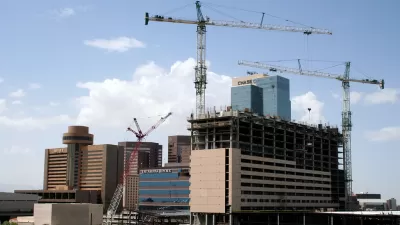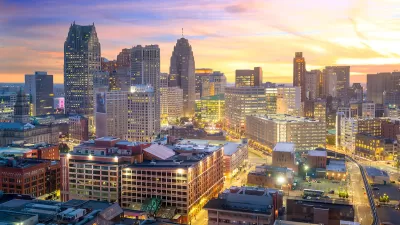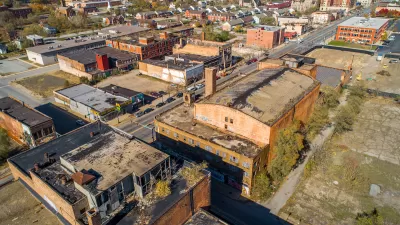While mayors of shrinking cities do all they can to buoy a discouraging metric, others ask whether population growth is all it's cracked up to be.

It makes sense to see leaders like Detroit mayor Mike Duggan focus heavily on population growth. As J.B. Wogan writes, "Population loss can become a symbol for other things people feel is going wrong in a city, such as rising poverty and unemployment rates, vacant and blighted housing, increased violent crime, the exit of pro sports franchises, racial segregation and police brutality."
People vote with their feet, so the story goes, and rising populations imply basic desirability. Wogan goes on, "Interestingly, it's the mayors of cities struggling to attract people who insist population numbers are the secret of success. The mayors of the fastest-growing cities tend to have a much different attitude about population gains."
The creed of growth-at-all-costs has its challengers. "Perhaps the leading voice in this contrarian club is Paul Gottlieb, an economist at Rutgers University. He has argued for decades not only that local elected officials should take a measured approach to growth, but that metropolitan areas with stable or slow-growing populations are likely to have greater economic prosperity." Wogan discusses similar views from Eben Fodor and Charles Marohn.
While residents of growing cities may not be automatically better off, interest groups like retailers, the real estate industry, and developers are often at hand to sing growth's praises. At the same time, analysis treating cities as separate entities from surrounding communities can oversimplify.
FULL STORY: Population Growth Means a City Is Thriving, or Does It?

Alabama: Trump Terminates Settlements for Black Communities Harmed By Raw Sewage
Trump deemed the landmark civil rights agreement “illegal DEI and environmental justice policy.”

Study: Maui’s Plan to Convert Vacation Rentals to Long-Term Housing Could Cause Nearly $1 Billion Economic Loss
The plan would reduce visitor accommodation by 25% resulting in 1,900 jobs lost.

Why Should We Subsidize Public Transportation?
Many public transit agencies face financial stress due to rising costs, declining fare revenue, and declining subsidies. Transit advocates must provide a strong business case for increasing public transit funding.

Paris Bike Boom Leads to Steep Drop in Air Pollution
The French city’s air quality has improved dramatically in the past 20 years, coinciding with a growth in cycling.

Why Housing Costs More to Build in California Than in Texas
Hard costs like labor and materials combined with ‘soft’ costs such as permitting make building in the San Francisco Bay Area almost three times as costly as in Texas cities.

San Diego County Sees a Rise in Urban Coyotes
San Diego County experiences a rise in urban coyotes, as sightings become prevalent throughout its urban neighbourhoods and surrounding areas.
Urban Design for Planners 1: Software Tools
This six-course series explores essential urban design concepts using open source software and equips planners with the tools they need to participate fully in the urban design process.
Planning for Universal Design
Learn the tools for implementing Universal Design in planning regulations.
Smith Gee Studio
Alamo Area Metropolitan Planning Organization
City of Santa Clarita
Institute for Housing and Urban Development Studies (IHS)
City of Grandview
Harvard GSD Executive Education
Toledo-Lucas County Plan Commissions
Salt Lake City
NYU Wagner Graduate School of Public Service





























